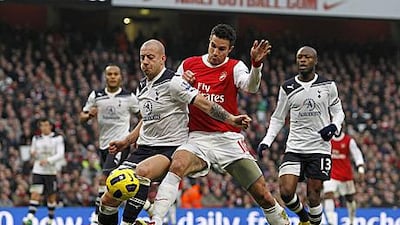The north London derby has plenty at stake this evening. Yet it struggles to shake off a residual feeling of emptiness, from both Arsenal and Tottenham Hotspur.
This was the season when the north of London had looked forward to staging three, perhaps four, maybe seven, derbies involving teams from the capital of England, including possible semi-finals and a final in the most glamorous competition of all.
This was to be London football's year. The city cannot avoid the feeling that chances like that will not come around again very soon.
For a start, a Champions League final will not be being staged at Wembley Stadium, as is scheduled next month, for many more years after 2011.
Last February, there looked a very high chance that the redesigned, rebuilt, so-called Home of Football would be welcoming at least one near neighbour to its grand continental event.
Arsenal and Spurs, who meet in the Premier League at White Hart Lane tonight, and Chelsea, who this evening play Birmingham City in the league and whose title they will shortly relinquish, were all in the last 16 of the European Cup.
Tottenham and Chelsea made it through to the last eight and the draw for the quarter- and semi-finals made it plausible they could meet each other at Wembley on May 28. But when the last four teams in Europe's principal competition cross swords next Tuesday and Wednesday, no London clubs will be involved.
So one of the great enigmas of modern football continues. It is a curious feature of the European Cup, in its older guise and its new one - the more elitist Champions League - that, for all that the tournament rewards huge capital expenditure, it eludes clubs from most major capitals.
Neither of the Rome clubs, Roma and Lazio, have ever won a European Cup. Nor has it ever been seized by teams from Berlin, Paris or Moscow. If Madrid, with Real's nine victories in the competition, is the notable exception, London is the most freakish absentee.
No club has featured in more Champions League semi-finals than Chelsea over the past six years; none has reached the knockout stages more consistently this century than Arsenal, who made the last 16 for the 11th successive time last December.
Yet a London club has never held club football's most prestigious prize.
George Graham, the former Arsenal and Tottenham Hotspur manager, used to argue that the heavy concentration of London teams, "too many intense derbies", made it harder for clubs in the capital to win England's domestic championship.
He said so before the rush of three successive Premier League titles accumulated by Arsenal and Chelsea between 2004 and 2006, but his point was well made.
Other managers, notably Sir Alex Ferguson at Manchester United, make psychological gain out of their own provincialism, caricaturing the capital as an enemy, the seat of power, of the English Football Association, the refereeing headquarters, and hinting at favouritism enjoyed by the clubs closer to all that.
There may be scant evidence of any truth in the idea, but as a motivating tool, that suspicion has its uses.
The strategy is employed across the major football nations of Europe, too.
In Barcelona, they take the same attitude, only louder. That club's relationship with Real Madrid, the team of the capital and the Spanish state, has always been nourished in those terms.
Bayern Munich's pre-eminence in modern German football frequently taps into Bavarian muscle flexing, aimed at the seat of federal power, Berlin.
French football's most important enmity is still that between snooty Paris and streetwise Marseille, whose fans taunt those of Paris Saint-Germain with the fact that only Marseille have ever brought the European Cup back to France.
In Portugal, Porto stir up the notion that Lisbon, be it Benfica or Sporting, is forever conspiring against the team from the second city.
None of which nearly explains or excuses the frailties exhibited by Arsenal during 2010/11, even if they will look back at derby dates like last November 20, when Arsene Wenger's team held a 2-0 lead over Spurs at Emirates Stadium, as among those that crucially weakened a season when the league title seemed more achievable perhaps than at any time since Arsenal last won it, in 2003/04.
Tottenham made a stirring comeback that afternoon and won 3-2.
But stirring comebacks against Arsenal are so regular now - Liverpool came back to draw 1-1 with a very late penalty on Sunday - that some sort of strategic revision is demanded of the Arsenal manager.
Wenger has dogmas, many of them appealing, such as his commitment to balancing budgets, and promoting, broadly, passing football. And Arsenal, six points off the top with six games remaining, could still win the Premier League next month.
But it would require a series of slip ups by Manchester United, the league leaders, and a steeliness with Arsenal that few would trust them capable of.
They look likelier to be left without a trophy, also-rans for a sixth successive season, and more and more the football equivalent of what modern London itself is increasingly seen as by outsiders: flashily cosmopolitan and rather self-indulgent.
10.45pm, Abu Dhabi Sports 3 & 5


